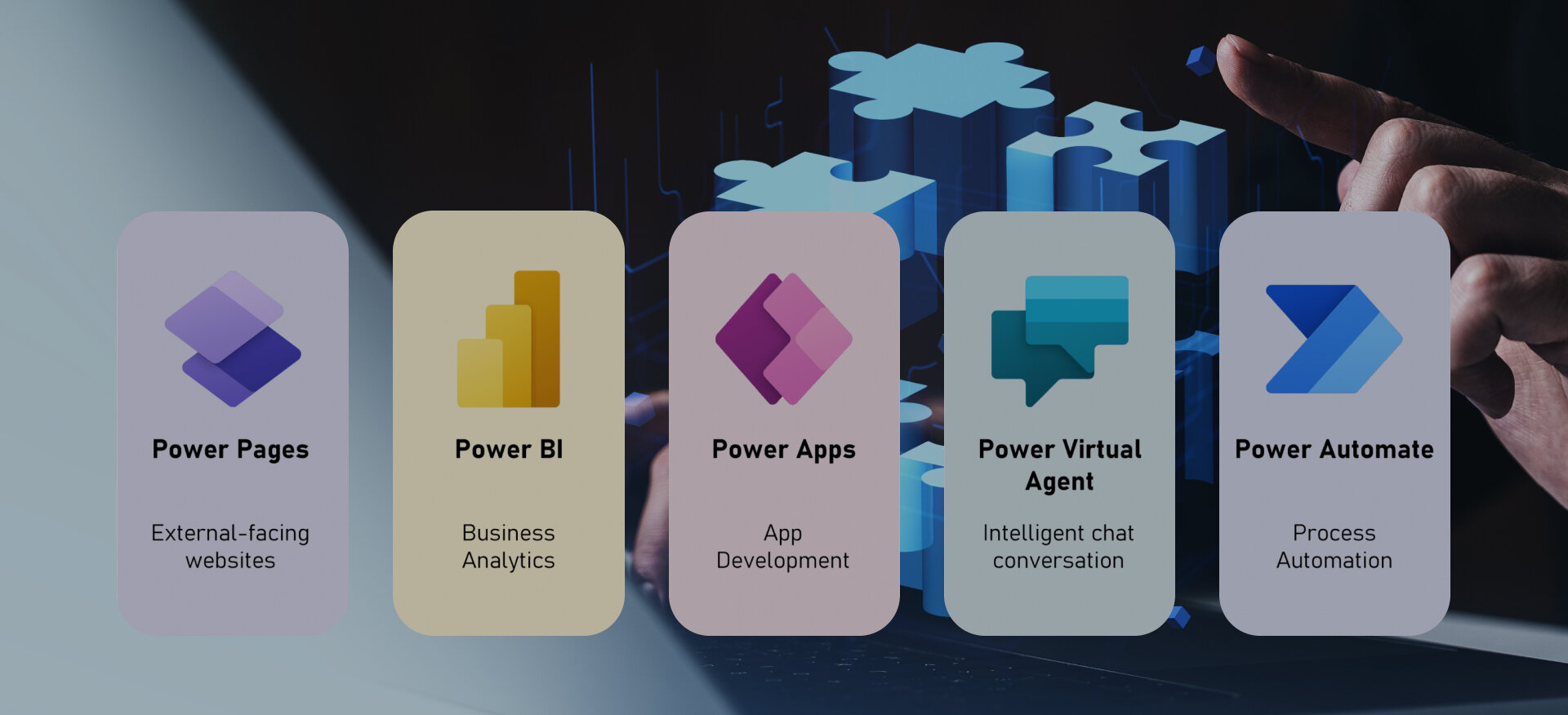According to GroupM, the global advertising market is projected to surpass $1 trillion in revenue for the first time in 2024, with digital advertising accounting for 73% of this total.
This surge is largely due to the rapid shift of businesses from traditional marketing methods to online platforms, driven by the increasing reliance on digital technologies by consumers.
Unlike traditional marketing methods that rely on print, television, or radio, digital marketing leverages the internet and electronic devices to reach and engage consumers.
For that reason, companies are now leveraging a variety of digital channels including social media, search engines, email, and content marketing to connect with consumers where they spend most of their time.
Moreover, Bain & Company reports that retailers utilizing AI-powered targeted campaigns have seen a 10% to 25% increase in return on ad spend.
So, how to get into digital marketing? For individuals looking to enter this dynamic field, understanding the fundamentals of digital marketing is important.
This guide will explore the essential skills, certifications, and strategies to help you embark on a successful digital marketing career.
How to Get Into Digital Marketing in 5 Easy Steps?
If you're wondering how to get into digital marketing and kickstart a successful career in this growing industry, the good news is that it’s more accessible than ever. Whether you're interested in internet marketing, online marketing, or the broader digital marketing industry, here's a comprehensive guide to help you navigate your way into this exciting field.
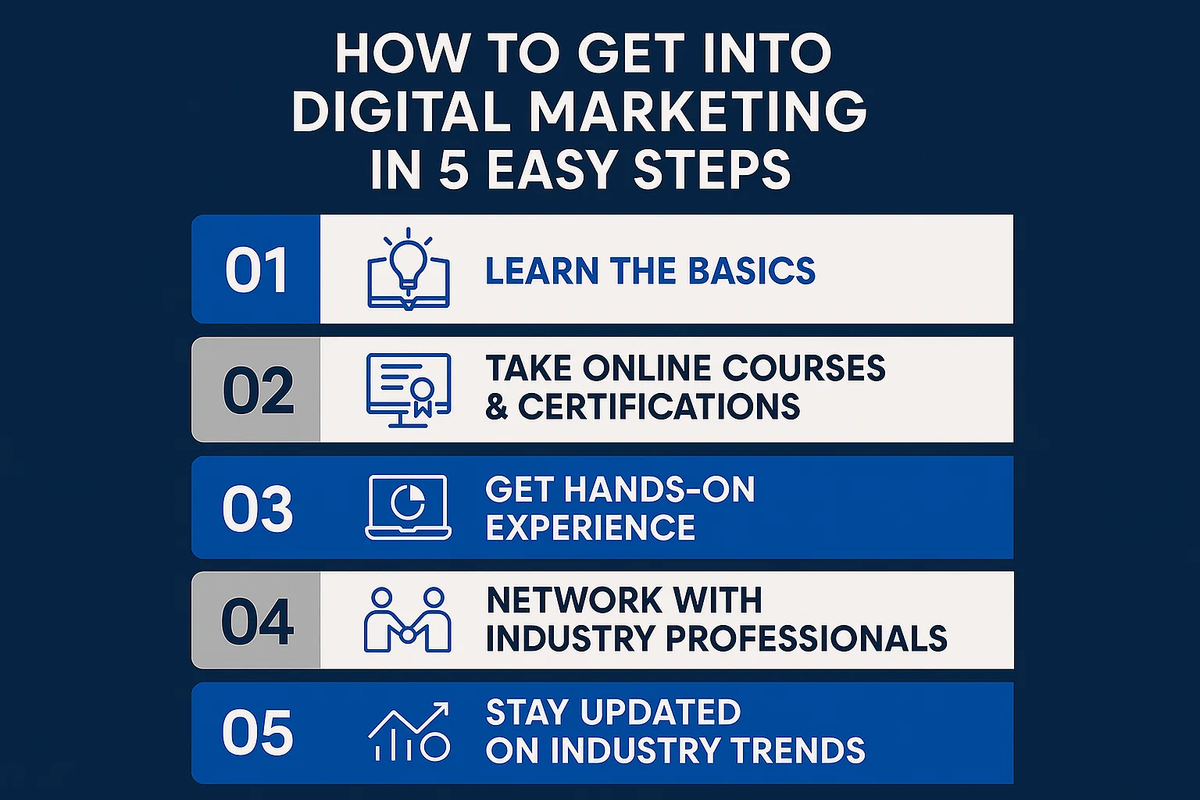
1. Learn the Basics
Before you dive in, it's essential to build a solid foundation of digital marketing knowledge. To get started, begin by familiarizing yourself with the core principles of internet marketing:
- Free Resources: Platforms like HubSpot Academy, Google’s Digital Garage, and Coursera offer valuable introductory courses in topics such as SEO services, content marketing, email marketing, and social media marketing. These resources provide free access to learning materials and certifications that can help you get a better grasp of the industry.
- Essential Skills: Focus on mastering skills like:
- Search Engine Optimization (SEO): Learning how search engines rank websites and how to improve a site’s ranking.
- Social Media Strategy: Understanding how platforms like Instagram, Facebook, LinkedIn, and Twitter can be used for marketing.
- Content Marketing: Creating valuable content that attracts and engages potential customers.
- Email Marketing: Developing effective email campaigns to nurture leads and convert them into customers.
By starting with free, high-quality resources, you can build the essential skills needed to get into digital marketing.
2. Take Online Courses & Certifications
Once you’ve grasped the basics, it’s time to further your expertise with online marketing courses and certifications. Many organizations and platforms offer specialized programs that can help you stand out:
- Google Analytics Certification: A must-have for anyone serious about measuring the success of digital campaigns.
- HubSpot Content Marketing: Ideal for those who want to specialize in content creation and strategy.
- Facebook Blueprint: A great option if you’re looking to get into social media marketing and learn the ins and outs of running ads on Facebook and Instagram.
These courses will provide you with the knowledge and credentials needed to break into digital marketing and make your resume shine. Having these certifications will give you a competitive edge in the job market.
3. Get Hands-On Experience
Practical experience is invaluable when trying to get into the digital marketing industry. The more you practice, the better your skills will become. Here’s how you can gain hands-on experience:
- Internships: Look for internship opportunities at marketing agencies or companies that offer digital marketing roles. Internships provide exposure to real-world campaigns and strategies.
- Freelance Work: Platforms like Upwork, Fiverr, and Freelancer offer freelance gigs that allow you to gain experience working on real projects.
- Personal Projects: Start your own blog, e-commerce site, or social media account and apply what you've learned. For example, you could create a blog and practice SEO techniques, or you could build a social media presence for your personal brand.
Hands-on experience is essential to get into digital marketing and gives you a chance to apply the theories you’ve learned in your online courses.
4. Network with Industry Professionals
Networking is a critical part of how to get into digital marketing. Building a network of connections with professionals in the field can help you stay updated on job opportunities, best practices, and new trends. Here’s how you can build your network:
- LinkedIn: Connect with digital marketing professionals and join LinkedIn groups focused on marketing. LinkedIn is a great platform to showcase your skills, share insights, and engage with others in the field.
- Webinars and Conferences: Attend industry events, both online and in-person, to meet professionals and learn about the latest trends and tools.
- Online Communities: Participate in online forums and social media groups related to internet marketing. Sites like Reddit, Facebook groups, and Quora can provide valuable insights into challenges and strategies.
Networking will give you insights from experienced marketers and help you build relationships that can lead to career opportunities.
5. Stay Updated on Industry Trends
The world of digital marketing is constantly evolving. To get into online marketing and stay ahead, it’s crucial to keep up with the latest trends and technologies:
- Blogs and Newsletters: Follow industry-leading blogs like Moz, Neil Patel, and Content Marketing Institute to stay updated on algorithm changes, new tools, and marketing strategies.
- Podcasts: Listen to podcasts on digital marketing while commuting or working out. Podcasts like The Digital Marketing Podcast or Marketing School with Neil Patel and Eric Siu offer valuable insights.
Staying informed will help you understand how to get into Internet marketing by being aware of the newest trends and best practices.
Why Choose a Career in Digital Marketing?
Digital marketing has emerged as a dynamic and rewarding career path, offering numerous opportunities for professionals worldwide.
Here's why you should consider entering this field:
1. High Demand for Digital Marketing Professionals
The digital marketing industry is experiencing significant growth.

According to the U.S. Bureau of Labor Statistics, employment for advertising, promotions, and marketing managers is projected to grow 8% from 2023 to 2033, faster than the average for all occupations. This growth is driven by the increasing reliance of businesses on digital platforms to reach their target audiences.
2. Work Flexibility With Remote and Freelance Opportunities
Digital marketing offers flexibility in work arrangements. Many companies provide remote or hybrid work options, allowing professionals to balance their personal and professional lives effectively.
The rise of freelance platforms has enabled marketers to work with clients globally, offering services such as SEO services, content creation services, mobile SEO services, and social media management.
3. Diverse Career Paths
The field of digital marketing encompasses various specializations, including:
- Content Marketing: Creating valuable content to attract and engage audiences.
- Search Engine Optimization (SEO): Optimizing website content to rank higher in search engine results.
- Pay-Per-Click (PPC) Advertising: Managing paid advertising campaigns to drive traffic.
- Social Media Marketing: Utilizing platforms like Facebook, Instagram, and LinkedIn to promote brands.
- Email Marketing: Crafting targeted email campaigns to nurture leads and retain customers.
For those interested in ongoing design work, opting for Monthly design retainers services can also provide a steady stream of creative support, enhancing both the visual and strategic aspects of digital marketing. This diversity allows professionals to specialize in areas that align with their interests and strengths.
4. Competitive Salaries and Growth Potential
Digital marketing professionals enjoy competitive salaries. For instance, the median annual wage for marketing managers was $$159,660 per year.

Entry-level positions, such as digital marketing specialists, have a median annual wage of $61,211.
With experience and specialization, professionals can advance to senior roles with higher earning potential.
Additionally, businesses seeking digital marketing solutions can significantly increase their visibility, which in turn creates more demand for skilled professionals in the field.
Thus, a career in digital marketing offers high demand, flexibility, diverse opportunities, and competitive compensation, making it an attractive option for individuals seeking a dynamic and rewarding profession.
Moreover, the role of mentorship in SDR career growth can also play a pivotal role in helping professionals progress quickly within digital marketing, especially in sales development roles.
Also Read: How To Do Digital Marketing
7 Main Areas of Digital Marketing
Digital marketing encompasses various strategies and digital marketing services to promote products or services online. For businesses trying to understand the broader landscape, comparing Performance Marketing vs Digital Marketing can help clarify how measurable, ROI-driven campaigns differ from traditional digital strategies.

Here's an overview of the primary areas:
1. Search Engine Optimization (SEO)
Search Engine Optimization (SEO) is the strategic process of enhancing a website's visibility
By optimizing various elements of a website, businesses can improve their rankings on search engines like Google, making it easier for potential customers to find them. Local SEO providers specialize in optimizing websites to attract local traffic, ensuring businesses are visible to nearby customers actively searching for their services.
Here are the key areas of SEO:
- On-Page SEO involves optimizing individual web pages to rank higher and earn more relevant traffic. Key practices include conducting thorough keyword research to identify terms your target audience is searching for, crafting compelling meta titles and descriptions, and ensuring high-quality, relevant content that addresses user intent.
- Off-Page SEO focuses on activities outside your website that impact your rankings. This primarily involves building high-quality backlinks from reputable websites, which signal to search engines that your content is valuable and trustworthy.
- Technical SEO addresses the backend aspects of your website that affect its performance and accessibility to search engines. As a crucial part of technical SEO, this includes optimizing site speed, ensuring mobile-friendliness, creating an XML sitemap, and implementing secure HTTPS protocols.
2. Social Media Marketing (SMM)
This involves leveraging platforms like Facebook, Instagram, Twitter, LinkedIn, TikTok, and Pinterest to engage with audiences, share content, and promote products or services.
Strategies include organic posts to foster community engagement, paid advertisements targeting specific demographics, and collaborations with influencers to expand reach and credibility.
Additionally, working with UX/UI specialists can help optimize the user interface and user experience across social media platforms, ensuring a seamless experience for users and improving conversion rates from social media campaigns.
3. Content Marketing
This strategy focuses on creating and distributing valuable, relevant content to attract and retain a target audience.
Common formats include blog posts that address audience interests, videos that provide engaging visual content, and infographics that simplify complex information.
4. Email Marketing
Email marketing entails sending targeted messages to prospects and customers to promote offerings, share news, or build relationships.
Types of emails in email marketing include newsletters for regular updates, promotional emails highlighting special offers, and transactional emails like order confirmations. This direct communication channel can lead to higher conversion rates and customer retention.
Try Our Email Marketing Services!
5. Pay-Per-Click Advertising (PPC)
PPC is an advertising model where advertisers pay a fee each time their ad is clicked. Platforms like Google Ads, Facebook Ads, and LinkedIn Ads allow businesses to place ads in search engine results or social media feeds. Pay-Per-Click advertising offers immediate visibility and measurable ROI, making it a valuable tool for driving traffic and conversions.
6. Affiliate Marketing
This performance-based strategy involves partnering with affiliates who promote a company's products or services and earn commissions for each sale or lead generated.
The process includes the affiliate promoting the product, the merchant providing the product, and the customer making a purchase. Affiliate marketing enables businesses to expand their reach through partners, sharing the marketing effort and cost.
7. Influencer Marketing
Collaborating with influencers individuals with significant online followings to promote products or services can effectively sway purchasing decisions.
Influencers range from macro-influencers, like celebrities with large audiences, to micro-influencers with niche, engaged followers. Their endorsements can enhance brand credibility and reach targeted demographics.
By integrating these strategies, businesses can create a comprehensive and effective digital marketing plan.
Explore Our Digital Marketing Services
8 Common Types of Tools You Must Know When Getting into Digital Marketing
Digital marketing tools are essential software applications and platforms that empower marketers to plan, execute, analyze, and optimize their digital campaigns efficiently.
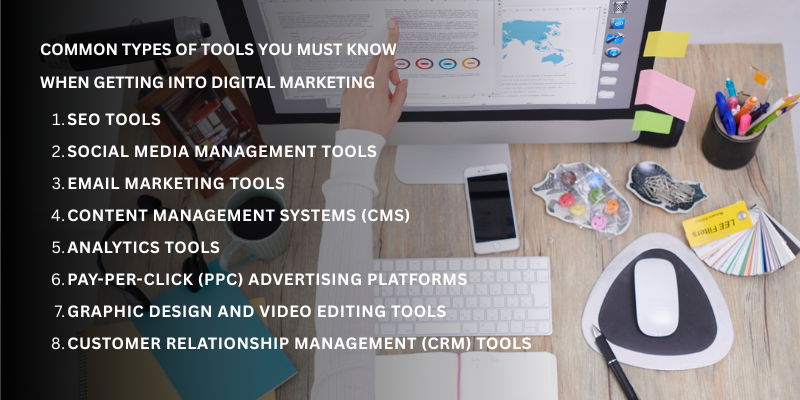
These tools automate repetitive tasks, provide valuable insights through data analytics, and facilitate targeted communication with audiences, ultimately enhancing marketing effectiveness and return on investment (ROI).
A digital marketing strategy includes various tools tailored to specific functions:
1. SEO Tools
Platforms like Google Search Console, Ahrefs, and SEMrush are some of the best SEO tools that assist in optimizing website content to improve search engine rankings, conduct keyword research, and analyze backlinks, driving organic traffic.
2. Social Media Management Tools
Tools such as Hootsuite, Buffer, and Sprout Social enable marketers to schedule posts, manage multiple social media accounts, and analyze engagement metrics, streamlining social media marketing efforts.
3. Email Marketing Tools
Platforms like Mailchimp, Constant Contact, and Sendinblue facilitate the design, automation, and tracking of email campaigns, enhancing communication with subscribers and customers.
4. Content Management Systems (CMS)
Systems like WordPress, Shopify, and HubSpot CMS allow marketers to create, manage, and modify website content without deep technical skills, ensuring a seamless user experience.
5. Analytics Tools
Adobe Analytics and Google Analytics provide insights into website and campaign performance, informing data-driven strategies and decision-making.
6. Pay-Per-Click (PPC) Advertising Platforms
Google Ads and Facebook Ads Manager enable marketers to manage pay-per-click advertising campaigns, targeting specific audiences to drive traffic and conversions.
7. Graphic Design and Video Editing Tools
Canva, Adobe Photoshop, and Adobe Premiere Pro assist in creating engaging visuals and video content, enhancing the appeal of marketing materials. . For businesses offering Web Design services, these tools are essential in crafting stunning website visuals and videos that captivate visitors and drive user engagement.
8. Customer Relationship Management (CRM) Tools
Salesforce and HubSpot CRM help manage customer interactions and sales pipelines, fostering stronger relationships and improving customer retention.
By integrating these tools into their marketing strategies, businesses can streamline workflows, achieve precise audience targeting, and leverage data to optimize campaigns, leading to improved efficiency and effectiveness in their digital marketing endeavors.
How To Build a Digital Marketing Portfolio?
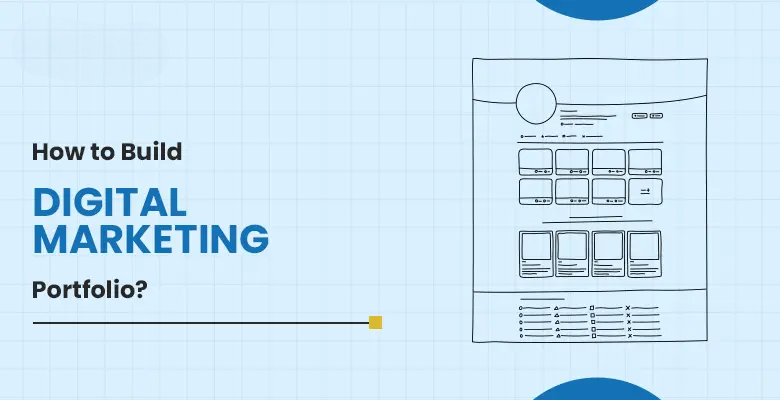
Creating a digital marketing portfolio is essential for showcasing your skills, experience, and accomplishments to potential employers or clients. It serves as tangible evidence of your capabilities, setting you apart in a competitive job market.
It provides concrete examples of your work, allowing others to assess your expertise and the results you've achieved.
Moreover, it reflects your commitment to the field and your ability to deliver measurable outcomes.
Here's how you can craft an impactful portfolio:
- Demonstrate your proficiency in teamwork, strategic planning, and digital marketing services by including projects that showcase your role in collaborative efforts.
- Incorporate a variety of projects to exhibit the breadth of your expertise Newsletters, Social Media posts, and Content Marketing articles
- Support Your Work with Data, Quantify the impact of your work by including metrics such as Engagement Rates, Conversion Rates, and Traffic Increases’.
- If you plan to include work done for clients, always seek their permission before publishing any proprietary information.
- If you prefer to keep personal social channels private, consider initiating a separate project that aligns with your interests Instagram Account and Blog.
How to Develop a Marketing Resume Based on Marketing Skills?
Crafting an effective marketing resume is crucial to capturing the attention of hiring managers and standing out in a competitive job market.
Here are key strategies to enhance your resume:
1. Maintain Clarity and Simplicity
Your resume should be clean and easy to read. Use clear headings and bullet points to organize information, ensuring that your layout is free from clutter. This approach allows hiring managers to quickly grasp your qualifications.
2. Emphasize Marketing Skills
Place your marketing-related skills and experiences at the forefront. Highlight areas such as SEO, content creation services, social media management, and email marketing. This immediate visibility showcases your relevant expertise.
3. Quantify Achievements
Use concrete numbers to demonstrate the impact of your work. For instance, stating that you "Increased website traffic by 30% through targeted SEO strategies" provides tangible evidence of your contributions.
4. Tailor Each Application
Customize your resume for each job application by incorporating keywords from the job description and aligning your experiences with the company's needs. This personalization indicates that you've taken the time to understand the role and how you fit into it.
5. Showcase Personality
While maintaining professionalism, let your personality shine through. This could be achieved by including a brief summary at the top or highlighting unique projects. Employers appreciate candidates who bring both skills and individuality to the team.
6. Organize Skills Effectively
Structure your skills into three categories:
- Marketing Skills: Technical abilities like proficiency in marketing software or platforms
- Transferable Skills: Skills from other areas that apply to marketing, such as writing or design.
- Adaptable Skills: Soft skills like leadership or problem-solving.
By implementing these strategies, you can create a compelling marketing resume that effectively communicates your qualifications and sets you apart from other candidates.
3 Challenges in Digital Marketing
Even if you know how to get into digital marketing, there are certain challenges you'll face in the field. These challenges are an important part of the job, and understanding them will help you become a more successful marketer.
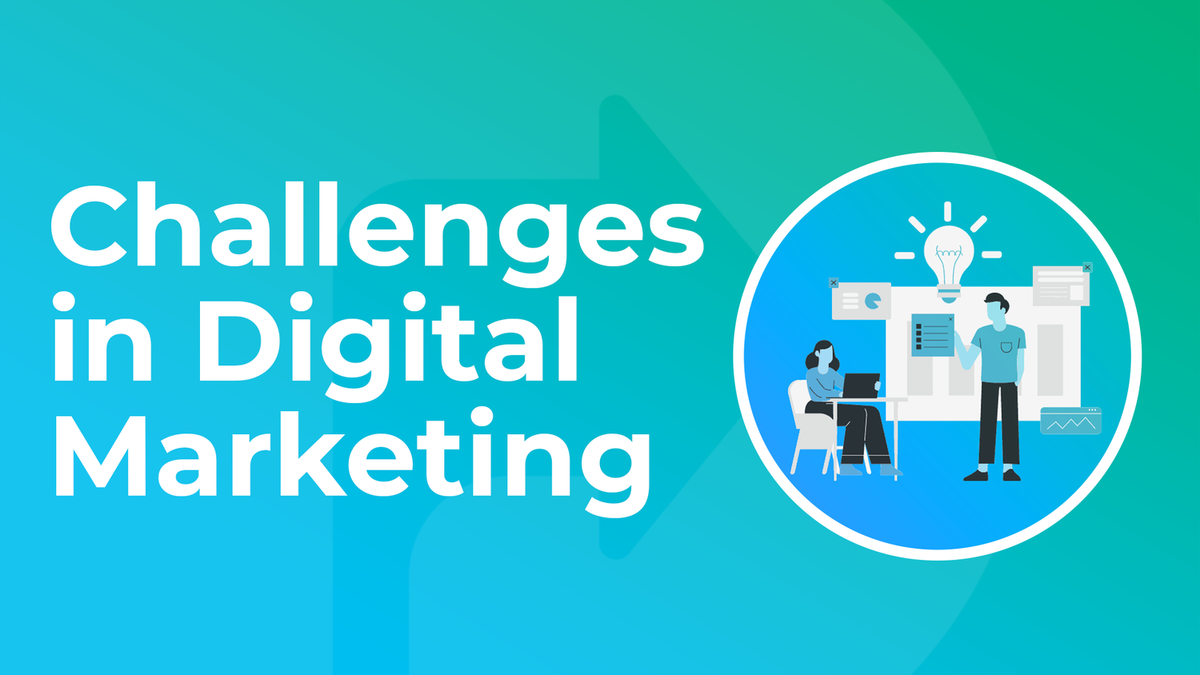
1. Constantly Changing Algorithms
As platforms like Google, Facebook, and Instagram evolve, so do their algorithms. Changes in these algorithms can have a significant impact on how content is ranked or how ads are shown. For example:
-
SEO Challenges: Search engine updates often result in shifts in rankings, which means digital marketers must continually update their strategies to stay relevant.
-
Social Media Shifts: Platforms often tweak their algorithms, making it difficult for businesses to maintain organic reach without paid promotions.
This means that to get into the digital marketing industry, you must be ready to adapt to these frequent changes and adjust your strategies accordingly.
2. Increased Competition
The digital marketing landscape is highly competitive. Whether it's securing ad space on Google, promoting your content, or ranking for keywords, businesses are battling for limited digital real estate. Some challenges include:
- Rising Ad Costs: With more businesses relying on digital ads, the cost per click (CPC) on platforms like Google Ads and Facebook Ads continues to rise.
- SEO Competition: Ranking for highly competitive keywords can require significant resources, including expert knowledge of SEO, content creation, and link-building techniques.
To succeed in internet marketing, you need to find unique angles and niches to differentiate yourself from the competition.
3. Measuring ROI
One of the ongoing challenges in digital marketing is accurately measuring Return on Investment (ROI). Unlike traditional forms of marketing, the impact of online campaigns is sometimes difficult to track, especially with long-term brand-building efforts.
- Attribution Models: Determining which marketing touchpoints led to a conversion can be complex, and using the wrong attribution model could lead to inaccurate results.
- Long-Term Campaigns: Building a brand through content marketing or social media takes time, and measuring the immediate ROI of these efforts can be difficult.
Having the right tools and data analytics knowledge will be crucial as you learn how to get into Online marketing and navigate these challenges.
Future Trends in Digital Marketing
The digital marketing landscape is constantly changing, and staying ahead of the trends is crucial if you want to get into digital marketing and succeed in the future. Here are some of the top trends shaping the industry:
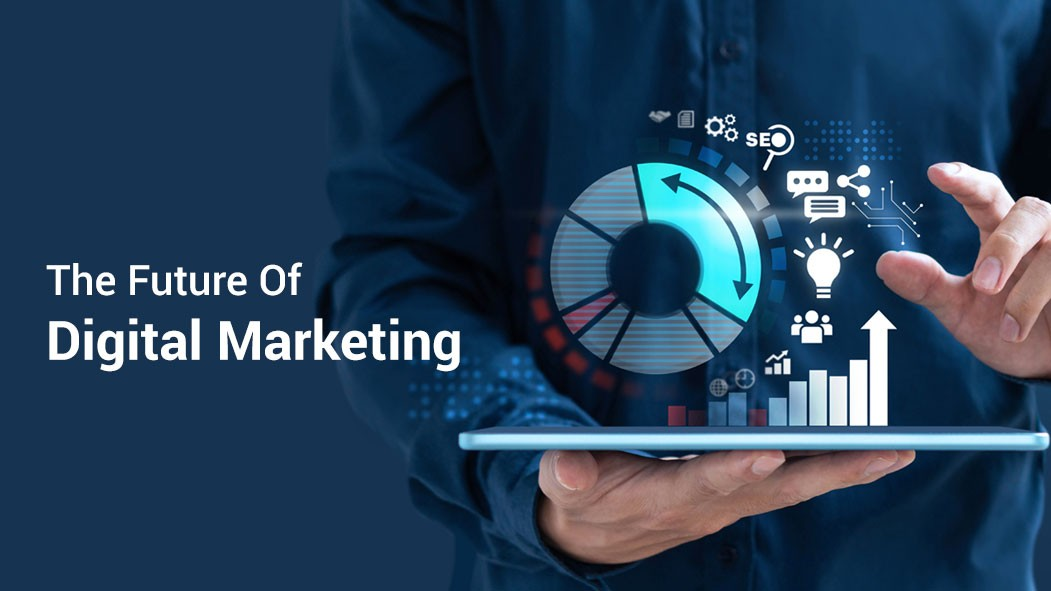
1. AI and Automation
Artificial intelligence (AI) and automation are transforming how marketers operate. AI tools can help automate tasks such as content creation, data analysis, and customer service, which allows marketers to focus on more strategic initiatives.
- Chatbots: AI-powered chatbots are becoming more common in customer service, offering personalized interactions and support around the clock.
- Predictive Analytics: AI can help predict customer behavior, enabling more targeted marketing efforts and personalized campaigns.
To get into online marketing, having a good grasp of AI tools and automation will give you an edge.
2. Voice Search Optimization
With the increasing use of voice-activated devices, optimizing for voice search is becoming more critical. Voice search is expected to account for a significant portion of internet searches in the coming years, which means marketers will need to adjust their SEO strategies to accommodate this change.
- Long-Tail Keywords: Voice searches tend to be longer and more conversational, so marketers will need to adjust their keyword strategies accordingly.
- Local SEO: Voice searches often involve local queries, so optimizing for local SEO will be essential.
3. Influencer Marketing
Micro-influencers with niche audiences are gaining popularity as brands seek more authentic and engaging partnerships. Brands will increasingly collaborate with influencers who align with their values and resonate with their target audiences.
4. Video Content
Video continues to be a dominant form of content. Short-form videos, especially on platforms like TikTok and Instagram Reels, are proving to be incredibly effective at capturing consumer attention. Marketers will continue to invest heavily in creating engaging video content to drive engagement and conversions.
By staying informed about these emerging trends, businesses can make strategic decisions on which campaigns to prioritize. For instance, understanding Performance Marketing vs Content Marketing helps marketers identify when to invest in short-term, conversion-focused campaigns versus long-term content-driven engagement strategies.
FAQs: How to Get Into Digital Marketing
How do I get into digital marketing?
Start by learning the basics through free online resources like HubSpot Academy and Google’s Digital Garage. Then, take certifications, gain hands-on experience, and stay updated on trends.
How can I get into digital marketing without prior experience?
You can start by creating personal projects, taking online courses, and gaining hands-on experience through internships or freelance work.
What certifications should I get to get into the digital marketing industry?
Key certifications include Google Analytics, HubSpot Content Marketing, and Facebook Blueprint. These will boost your credibility and skills.
How do I get into online marketing as a beginner?
Start with free resources to learn SEO, social media, and content marketing. Then, apply your knowledge by working on personal projects or internships.
What skills do I need to get into internet marketing?
Key skills include SEO, social media management, content marketing, and email marketing.
How do I break into digital marketing if I’m changing careers?
Take online courses, apply your transferable skills, and gain practical experience through personal projects, internships, or freelancing.
Conclusion: Start Your Digital Marketing Journey Today
With the increasing shift of businesses to online platforms, the demand for skilled digital marketers continues to grow. Whether you're a recent graduate, a career changer, or someone looking to enhance your current role, now that you know how to get into digital marketing, you can explore diverse opportunities that cater to various interests and skill sets.
One of the key takeaways is that formal education is not a strict prerequisite. Many successful digital marketers have built their careers through self-learning, practical experience, and a proactive mindset. As highlighted by industry professionals, showcasing your work be it through personal projects, freelancing, or contributing to online communities can significantly boost your visibility and credibility in the field.
Continuous learning is essential in the ever-evolving landscape of digital marketing. Staying updated with the latest trends, tools, and strategies ensures that you remain competitive and effective in your role. Lastly, engaging in online courses, webinars, and industry events can provide valuable insights and help you adapt to new challenges and opportunities.



